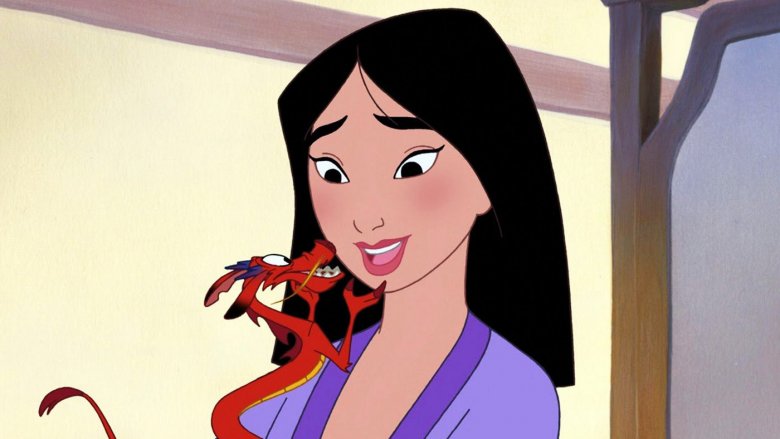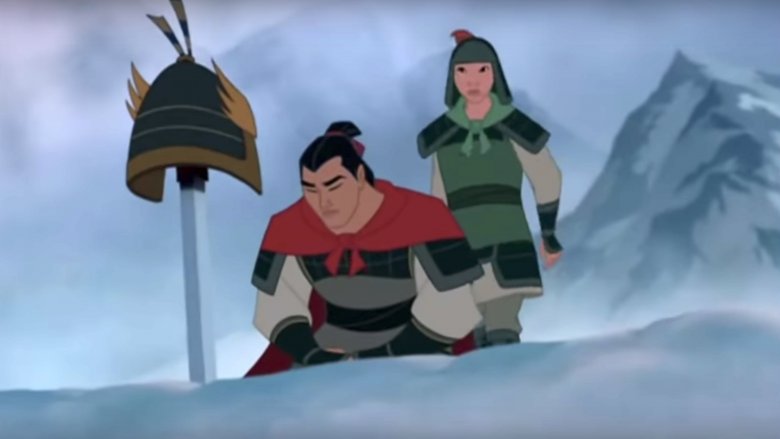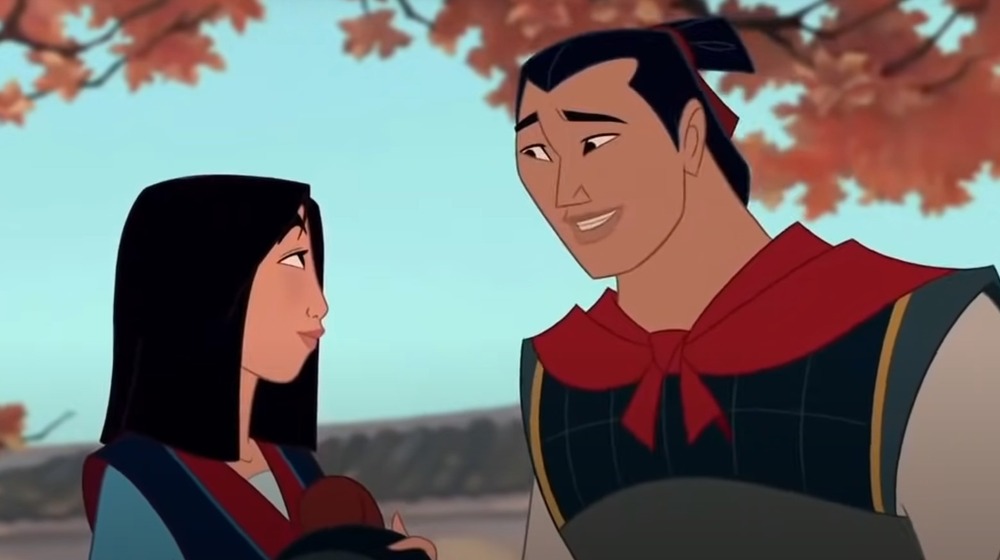Things In Mulan You Only Notice As An Adult
Mulan was groundbreaking in many ways. The 1998 film upended the Disney princess genre by featuring a take-charge woman rather than a damsel in distress. While it hinted at a romance at the end of the film, Mulan is also not a love story — another departure from the typical Disney princess movie formula. But for all of its good aspects, there are some pretty problematic things in the movie, along with some other things only an adult would notice when watching Mulan.
Mulan would not have fought against the Huns
It's expected that a Disney film will have a certain number of historical inaccuracies since they are usually more focused on telling an entertaining story than making a factually accurate film. While it's easy to let a lot of these errors slide, the bad guys in Mulan are pretty hard to ignore. According to The Guardian, Attila, who ruled the Hunnic empire from 434 to 453 when the empire was at its most powerful, "may have been a contemporary of Mulan's, if she existed."
The problem is that "the eastern limit of Attila's territory was around the Caucasus, 3,000 miles from Northern Wei territory, and the thrust of his military efforts was westwards into Europe, not eastwards to China." In short, Mulan did not get down to business to defeat the Huns.
The original story is even more epic
Disney is infamous for altering the source material that their films are based on. In many cases, this is to make it less scary for younger audiences, such as when fairy tales are updated to eliminate some of their more gruesome elements. In the case of Mulan, however, the story is made a lot less epic.
In the original legend, Mulan lived either during the Sui Dynasty or the Northern Wei Dynasty. What remains consistent among retellings is that she did volunteer herself in order to save her father. A key difference is that, in the legend, rather than being raised to be a docile wife, Mulan was actually trained in martial arts by her father from childhood. She read her father's books and became an expert in military strategy. When the emperor put together an army to fight off invading tribes, Mulan volunteered to take her father's place as her brother was still too young.
Unlike in the film, Mulan's parents knew what she planned to do and eventually supported her. Mulan ended up staying in the army for 12 years and was highly honored at the end of the war.
Mulan shouldn't be using a folding fan
Another major anomaly in the film is the folding fans that are used. While fans have been around for millennia, the type of fan Mulan is using would not have been used at that time period. Mulan would more likely have used a flat, circular fan. The earliest folded fans were found in 8th century Japan, but didn't become commonly used in China until the 15th century — long after Mulan would have lived.
Why does the Fa family have only one child?
It seems pretty strange that the Fa family only has one child. Judging from their home and the vast expense of their property, the Fa family is probably reasonably well off and could afford to have another child. The absence of more children is even stranger when you consider the long-held preference in Chinese culture for male children which continues even into modern times. Male children have traditionally been preferred, in part as a form of insurance. Women were married off and became part of the husband's home, caring for their in-laws as their husband's parents grew older. Having a son ensured that someone would care for the parents in their old age.
Even if we were to assume that Mulan's mother couldn't have anymore children, it was common to have concubines at this time. Had the Fa family had a son, there would have been someone to take the place of Mulan's father. The original story makes more sense in this regard, as Mulan does have a younger brother but he is too young to take his father's place.
Why do the bad guys have dark skin?
It's pretty troubling that the Huns in the film are all portrayed with darker skin. The preference for lighter skin is deeply rooted in Chinese culture, as it is in much of Asia. This alarming trend results in many people, especially women, lightening their skin with whitening products. Those with darker skin are often viewed as inferior.
Perpetuating these outdated ideals of beauty in what is supposed to be a children's movie is not only problematic but also points to a larger trend in which special privilege is given to those with lighter skin in the media. Not cool, Disney.
How is there only one young, attractive man in the film?
There are a lot of men in this film, and the vast majority are not conventionally attractive. This could perhaps be overlooked, if it weren't for the fact that Mulan's eventual love interest, Shang, is clearly meant to contrast the other men. Shang is tall and handsome, with a pointed nose which gives him more European features than the other men who are portrayed with rounded, flat noses. Mulan's father is an older, distinguished gentleman who, much like Shang, is portrayed as being tall with a more pointed nose.
This is especially distressing when you look at how Asian men have historically been emasculated in Western media. Eddie Huang, author of Fresh Off the Boat, wrote an op-ed in The New York Times about the stereotypical portrayal of Asian men in media. Huang said "every Asian-American man knows what the dominant culture has to say about us... we're naturally subordinate, our male anatomy is the size of a thumb drive and we could never in a thousand millenniums be a threat to steal your girl."
In portraying Shang with European features, Disney sends the message that Asian men aren't desirable.
There were no rockets in ancient China
Many people know that fireworks were developed in China, but at the time that Mulan would have lived, rockets hadn't yet been invented. In a history of fireworks, History.com wrote that it wasn't until the 10th century that the Chinese "had developed crude bombs and begun attaching firecrackers to arrows that rained down on their adversaries during military engagements."
It would be another two centuries before "they learned how to fire explosives into the air and guide them toward enemy targets, essentially building the first rockets." Mulan and the Chinese army would most likely have fought the enemy with arrows, swords, or hand-to-hand combat.
How did the Hun army survive being buried in snow?
Watching an animated Disney film usually requires the viewer to suspend their disbelief, but sometimes that gets a little tricky to do. One of the hardest times to do this in Mulan is during the big battle scene when Mulan shoots a rocket at a mountain, creating an avalanche. When the avalanche buries the Huns in the snow, the army goes off to the capitol to celebrate their victory, but Mulan soon discovers that the Huns survived.
As a kid, I didn't question this much. As an adult, however, I want to know how the Huns survived being buried under what looks like several feet of snow. The impact alone should have caused some severe damage, if it didn't kill them outright. But how did they survive the cold? How did they manage to dig their way out? Do they have some sort of supernatural powers? It just doesn't make any sense.
Shang probably felt conflicted about his sexuality for a while
Shang and Mulan share some pretty emotionally intimate moments while Mulan is masquerading as a man. While the audience can appreciate the growing attraction Mulan has for Shang, most kids probably aren't thinking about how conflicted Shang must feel. He is clearly drawn to Mulan, who he thinks is a man. This probably led to a lot of confusion about his sexuality, which might be why Shang acts as if he has been personally betrayed when it's revealed that Mulan is a woman.
Leaving someone out in the snow does not count as saving their life
Shang supposedly spares Mulan's life instead of killing her when he finds out she's a woman because she had saved his life. This is meant to repay the debt he owes her, but he doesn't actually do anything to make sure that Mulan survives. She only has a tiny fire, and is wearing light clothes with nothing more than a skimpy blanket to protect her from the cold. A basket of dumplings wouldn't be enough to keep her fed on the long journey home, assuming that she even knew how to get there. Shang didn't really spare Mulan's life, he just condemned her to die a long, slow death in the cold.
Mulan doesn't actually question traditional roles at any point
For a movie that is meant to show a woman can do what a man can do, it seems pretty strange that Mulan does not question traditional gender roles at any point. When she is sent to the matchmaker, she genuinely tries to conform to the feminine ideal and feels like she has failed her family when she doesn't. Even when she joins the army, it is not out of a belief that she is equal to a man, but because she wants to save her father.
Women in ancient China were generally treated as inferior and were typically expected to be subservient to men. While Mulan eventually rebels against these gender roles, she never actually questions them.
Mulan should have kicked Shang to the curb
Mulan thankfully didn't end with Mulan and Shang falling in love and living happily ever after, but their eventual romance is heavily hinted at by the end of the film. If Mulan had truly evolved into a strong, independent woman, she would have sent this guy packing instead of asking him to stay for dinner. This is the same guy who pretty much left her to die in the snow and then refused to listen to her warning that the Huns had survived.
At the very least, Mulan should have demanded an apology for Shang's despicable behavior. The fact that she lets him off the hook so easily is a disappointing way to end the film.


